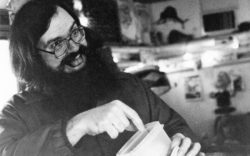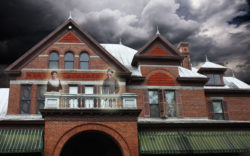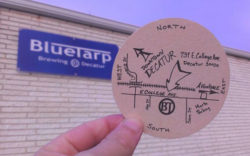My father taught at the University of Georgia from late 1946 until his death in 1973. It was my fortune to have to take two lab science courses in sequence, and Zoology, Biology, and Botany were the three choices. I opted for Botany 121 and 122, taught in auditorium-sized classes by one Dr. William M. Carlton, none other than my own Old Man. I told him in advance of my choice, and let it be known in no uncertain terms that I wanted no special favors. “I may have to be a little harder on you, then,” my dad mused, “especially by the time everyone learns who you are.” I accepted this, knowing my father to be a fair person.
The quarter passed uneventfully. I heard jokes that had made me cringe for years told again, and then I was rewarded with some new ones I had yet to be privy to. My dad was a great teacher, and all prejudices aside, I think he was one of the best I ever had in college… seriously. I learned a lot, and have retained a surprising bit of it even now, although I never have to use it. I digress, but only slightly.
It was the last of February or the first of March of Winter Quarter. It was reasonably warm outside, and birds were migrating back north from Florida, little suitcases in tow. One day, the back door adjacent to the lectern was open to catch the breeze, and in flew and especially venturesome little sparrow. It lit on the lectern directly in front of my dad. He paused in his lecture, then pointed gently to the bird and said: “You better be paying attention, little feller: we’re having a quiz on this Friday, and I haven’t see you taking notes.” With that, the bird suddenly flew off, obviously quite shocked to be caught without a pencil at a time like this. My dad watched the bird depart, then turned around to face the class, shrugged his shoulders, and said: “So much for ornithological education.” The class roared with laughter.
One day he lapsed off into an especially tired old joke that he had used on me until it was frayed around every conceivable edge. I covered my ears and closed my eyes, telling the person next to me to tap me when it was over. Soon I felt a tap. It was my dad instead. “The joke’s over,” he boomed, “and now it’s on you.” Everyone broke out in peals of laughter. He walked down toward the front, resuming class with “What he doesn’t know is that while he was ignoring me, I told everyone else everything that’s going to be on the final. Watch him make a 22 on it now.” I wish I could lie to you and tell you that he printed my copy of that test in Armenian script, but that isn’t so. I did pass, by the way.
One poignant note I remember well was the day he was talking about distribution and the relative commonness in one area of a plant that, in the overview, is extremely rare. One such is a fern that thrives along the Peace River in Hardee and DeSoto Counties in Florida and exists only in a couple of other places on the globe. He was speaking of this fern and broke off, paused, and buried his face in his hands and began to cry in front of 220 students. He interrupted himself only to say, brokenly: “I can’t go on. See you Wednesday.” I ran down front to see what the matter was, in plain view of everyone puzzledly packing up and trailing out. I threw my arms around his neck and hugged him. “What’s the matter, Daddy?” I asked, shocked to the core. He regained his composure and told me and the several folks nearby who were wondering: “That fern grows in profusion where my dad and I used to slip off to have our talks. I was thinking about him.” Carrying on the legacy of caring, I think about my dad quite often just like he thought of his: fondly, warmly. Hey, I just thought you’d like to know.
My grandfather Carlton had a maiden sister named Pearl Pamelia Carlton. She died at age 57 of some unspecified illness, leaving my still-living great grandfather to fend pretty much for himself. But when they lived on the old homeplace, Pearl had a parrot: named Polly, naturally enough. There was a huge old silk oak tree outside the detached kitchen, which was built on the back of the house, like was commonly done in Florida prior to modern days. The place dated from the 1870’s and had a dog trot through the middle of it. It was destroyed in a range fire about 1953. But Polly used to go out in the silk oak tree and find a branch and grab onto it with her beak and swing around and around and around, making huge grooves in the limbs. Aunt Pearl kept warning Polly not to do that. “You’re gonna fall out of that tree one day,” Aunt Pearl warned Polly. The parrot remained oblivious to the danger and continued its custom. One day, she chose an especially small limb for her trick and succeeded in <<de facto>> chewing it right off the tree. Down it crashed, and poor Polly went with it. Ke-rash!!!!! The hapless parrot, lucky to be alive, dusted herself off with chagrin and walked around to the open kitchen door, where Aunt Pearl was rustling up a little bit of not much for dinner. “Aunt Pearl, I fell!!” she exclaimed. Polly never went up in the silk oak again except to sun herself in the Florida warmth.
Parrots aside, I think of newspaper names: past and present. Still printing, as far as I know, are the Daily Sitting Herald in Arkadelphia, Arkansas; The Thibodeaux Comet in Louisiana; The Bloomington, Illinois Pantagraph; The Canton (Ohio) Repository; The Youngstown (Ohio) Vindicator; and the Daily Whig-Standard in Kingston, Ontario Canada. Those are current dailies all. Now, among the annals of the deceased, come these: The Key West (Florida) Equator-Democrat; The Daily Cosmos-Monitor of Saint Charles, Missouri; the Daily Wheels of Progress (I forget where); and the killer-of-all: the great Georgia journalist Henry W. Grady was asked to name a fledgling newspaper in Anniston, Alabama: his name: The Daily Hot Blast. Unfortunately, this one was absorbed by the Anniston Star years ago, but mention of it still is made each day on the editorial page. The Anniston Star is a family-owned newspaper: the Ayers family still runs it. They are an anomaly: liberal Democrats in a town where the economy is largely controlled by the military. Not to worry. The Anniston Star is a prize-winning daily of about 20,000 circulation. I know. Billo Wilson works there. He’s their star photographer. Billo used to live in Tuscaloosa, where he worked for The Vinyl Solution and went to school. He built up a retinue of friends and they have largely stayed with him in his moves, first to Nashville, then to Anniston. I need to go see him. He is truly an interesting guy. Hurricane Billo, as I call him, is famous for taking rolls of pictures of the likes of the city council meetings of Hobson City, Alabama (an almost-all-Black municipality adjacent to Anniston which dates from 1901); the post office in Choccolocco, Alabama (where he used to have a post office box); and The Couch family, a famed group of Anniston intellectuals who sit on their front porch in a rather seedy part of town and watch—and are a part of—the passing parade. It is said that once the Couch family was having a yard sale and nobody noticed: everything looked just like it always did, and of course nobody thought to put up a sign.
I suppose this column will run a little short, but no matter. It’ll do. Now to proofread this and go to sleep: tomorrow begins at midnight, and it’s already after 11:
(30).
Like what you just read? Support Flagpole by making a donation today. Every dollar you give helps fund our ongoing mission to provide Athens with quality, independent journalism.









